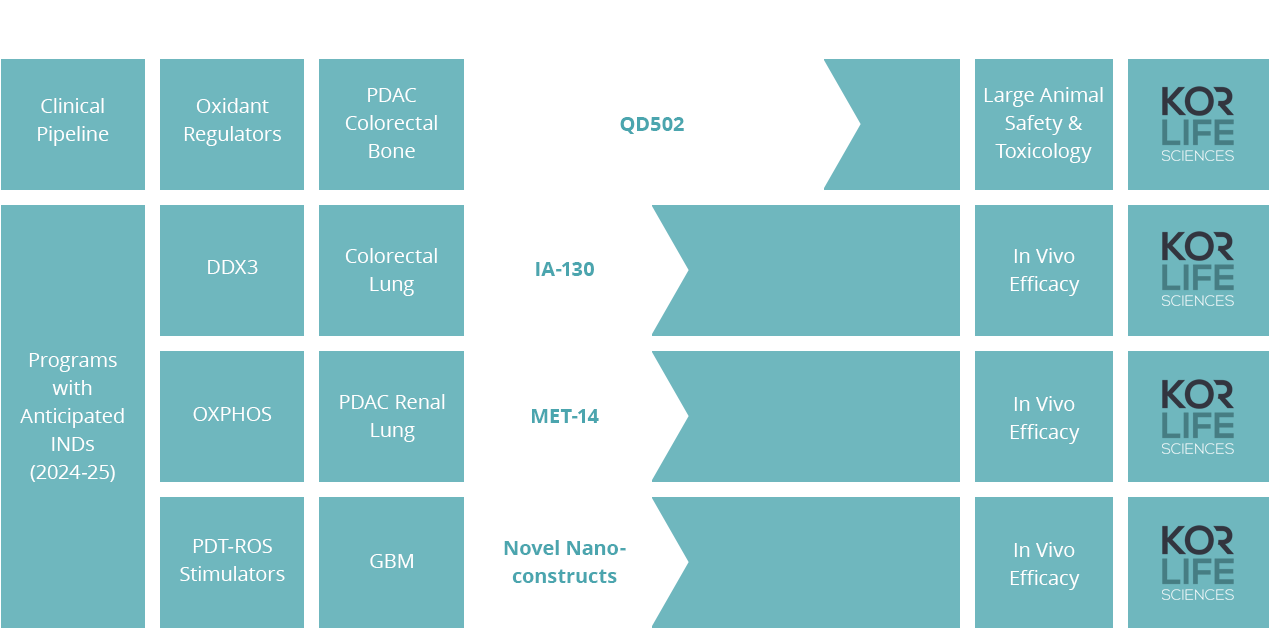Leading the way in novel therapeutic drug discovery.
Our Focused Plan for Molecular Insights to Targeted-Therapeutic Innovations
KOR Life Sciences is actively involved in a diverse range of projects that span across multiple healthcare sectors. Our focus areas encompass therapeutics, diagnostics, and the burgeoning field of personalized medicine. Our intent, via a substantial and well-planned research and development program, is to find solutions to some of the most challenging and intractable health problems of the present day. The focal point of our research centers on leveraging recent findings concerning molecular targets. We aim to fundamentally transform the existing treatment modalities by developing superior alternatives. Specifically, our attention is primarily directed towards studying metabolic changes and the duplication processes of pathogenic DNA/RNA, occurrences often observed in different types of cancer.
The investigational drugs and pioneering compounds under KOR Life Sciences’ umbrella are presently undergoing development stages. In these phases, we are engaged in refining treatment methodologies, conducting preclinical-IND enabling studies, and establishing their mechanisms of action in relation to specified indications.
Programs above are all focused on oncology indications: PDAC (Pancreatic Ductal Adenocarcinoma and GBM (Glioblastoma)
Program Details
Oxidant Therapies
Therapeutic strategies centered around oxidants have emerged as a potential powerhouse within the realm of biopharmaceuticals, opening the door to innovative treatments for various health conditions. KOR Life Sciences is delving into the capabilities of these oxidant therapies, which capitalize on oxidants like reactive oxygen species (ROS) to precisely regulate particular cellular activities. In areas like oncology, wound management, and immune regulation, the robust oxidizing features of these molecules are put to work. Notably, these therapies can wield a toxic impact on cancer cells, obstructing their growth and survival pathways while leaving healthy cells unharmed.
In a collaborative effort with the University of Michigan, KOR Life Sciences has spearheaded the development of a unique quinazoline-based molecule, capable of distinctly adjusting oxidants within cancers, leading to their demise. Our lead compound, QD502, is an orally bioavailable, water-soluble small molecule that holds a proprietary patent showing great potential in eradicating cancers in multiple preclinical models. With continued research and impending clinical trials, QD502 stands at the cusp of a breakthrough, poised to transform the biopharmaceutical landscape, and aid the evolution of novel cancer treatment tactics.
DDX3 Inhibitors
DEAD-box helicase 3, has shown promise as an exciting target within biopharmaceuticals. This RNA helicase is a critical component in numerous cellular activities, including mRNA translation, RNA splicing, and viral replication. Dysregulation of DDX3 has been associated with various diseases, including cancer, viral infections, and neurological disorders. KOR Life Sciences, in its mission to develop effective treatments, is investing in research to discover small molecules or biologics that selectively target DDX3. Several DDX3-targeting molecules have been synthesized, and through a solid lead campaign, we have identified IA-130 as a promising candidate for further development. Preliminary studies suggest that managing DDX3 activity can curb tumor growth in colorectal and lung cancers.
OXPHOS Regulator
The Oxidative Phosphorylation (OXPHOS), plays a pivotal role in the production of cellular energy and is thus drawing significant attention in the biopharmaceutical sector. This process takes place within the mitochondria, and disruption of OXPHOS has been linked to diseases like metabolic disorders, neurodegenerative diseases, and cancer. KOR Life Sciences is exploring the potential of OXPHOS as a therapeutic target. Our lead OXPHOS regulator, MET-14, a small molecule inhibitor, targets the electron transport chain components and induces alterations in energy metabolism, leading to the death of cancer cells. This in-depth understanding of the intricate connection between OXPHOS and disease progression holds tremendous promise for enhancing KOR Life Sciences’ intervention strategies and improving patient outcomes.
Lanthanide Based Nano Construct
Photodynamic therapy (PDT) is a promising methodology in the biopharmaceutical field for treating various diseases. This innovative treatment leverages a photosensitizer that congregates in target tissues or cells and is then exposed to light of specific wavelengths. This light exposure prompts the photosensitizer to generate reactive oxygen species (ROS), resulting in localized cell damage or destruction. PDT has proven effective against cancer, skin conditions, and certain infections, offering a targeted and minimally invasive alternative to conventional treatments. KOR Life Sciences is committed to developing advanced lanthanide-based nano-constructs that can enhance the therapeutic outcomes of photodynamic therapies in conjunction with existing photosensitizers, light sources, and treatment protocols. Given the site-specific action and decreased side effects, PDT appears promising as a valuable therapeutic option for challenging cancers such as glioblastoma.
A new understanding of disease.
Our mission is to develop & deliver oncology, cardiovascular, and other therapies for patients with high unmet medical needs.

